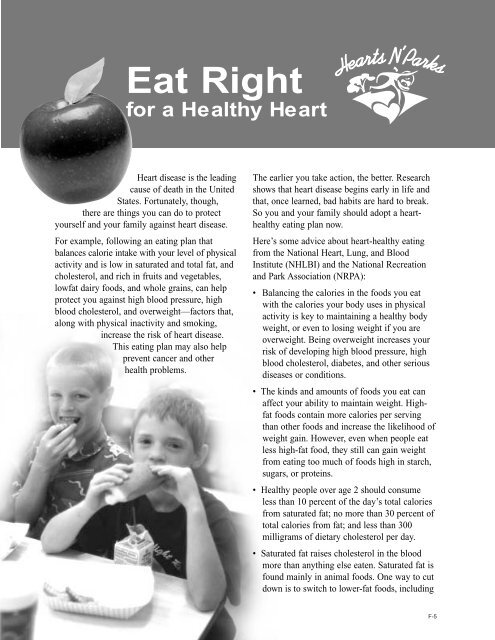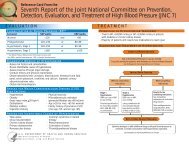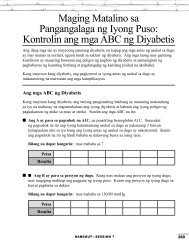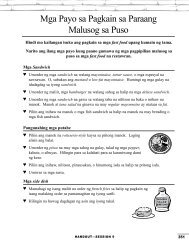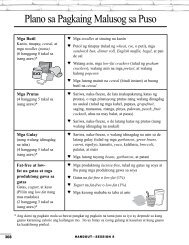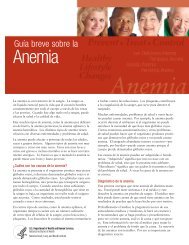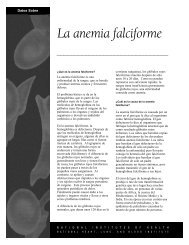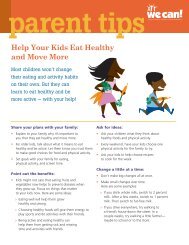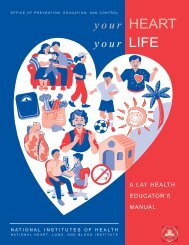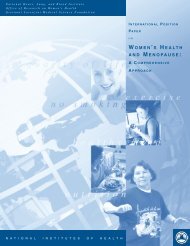HeartsNParks Community Mobilization Guide - National Heart, Lung ...
HeartsNParks Community Mobilization Guide - National Heart, Lung ...
HeartsNParks Community Mobilization Guide - National Heart, Lung ...
Create successful ePaper yourself
Turn your PDF publications into a flip-book with our unique Google optimized e-Paper software.
Eat Right<br />
for a Healthy <strong>Heart</strong><br />
<strong>Heart</strong> disease is the leading<br />
cause of death in the United<br />
States. Fortunately, though,<br />
there are things you can do to protect<br />
yourself and your family against heart disease.<br />
For example, following an eating plan that<br />
balances calorie intake with your level of physical<br />
activity and is low in saturated and total fat, and<br />
cholesterol, and rich in fruits and vegetables,<br />
lowfat dairy foods, and whole grains, can help<br />
protect you against high blood pressure, high<br />
blood cholesterol, and overweight—factors that,<br />
along with physical inactivity and smoking,<br />
increase the risk of heart disease.<br />
This eating plan may also help<br />
prevent cancer and other<br />
health problems.<br />
The earlier you take action, the better. Research<br />
shows that heart disease begins early in life and<br />
that, once learned, bad habits are hard to break.<br />
So you and your family should adopt a hearthealthy<br />
eating plan now.<br />
Here’s some advice about heart-healthy eating<br />
from the <strong>National</strong> <strong>Heart</strong>, <strong>Lung</strong>, and Blood<br />
Institute (NHLBI) and the <strong>National</strong> Recreation<br />
and Park Association (NRPA):<br />
• Balancing the calories in the foods you eat<br />
with the calories your body uses in physical<br />
activity is key to maintaining a healthy body<br />
weight, or even to losing weight if you are<br />
overweight. Being overweight increases your<br />
risk of developing high blood pressure, high<br />
blood cholesterol, diabetes, and other serious<br />
diseases or conditions.<br />
• The kinds and amounts of foods you eat can<br />
affect your ability to maintain weight. Highfat<br />
foods contain more calories per serving<br />
than other foods and increase the likelihood of<br />
weight gain. However, even when people eat<br />
less high-fat food, they still can gain weight<br />
from eating too much of foods high in starch,<br />
sugars, or proteins.<br />
• Healthy people over age 2 should consume<br />
less than 10 percent of the day’s total calories<br />
from saturated fat; no more than 30 percent of<br />
total calories from fat; and less than 300<br />
milligrams of dietary cholesterol per day.<br />
• Saturated fat raises cholesterol in the blood<br />
more than anything else eaten. Saturated fat is<br />
found mainly in animal foods. One way to cut<br />
down is to switch to lower-fat foods, including<br />
F-5


